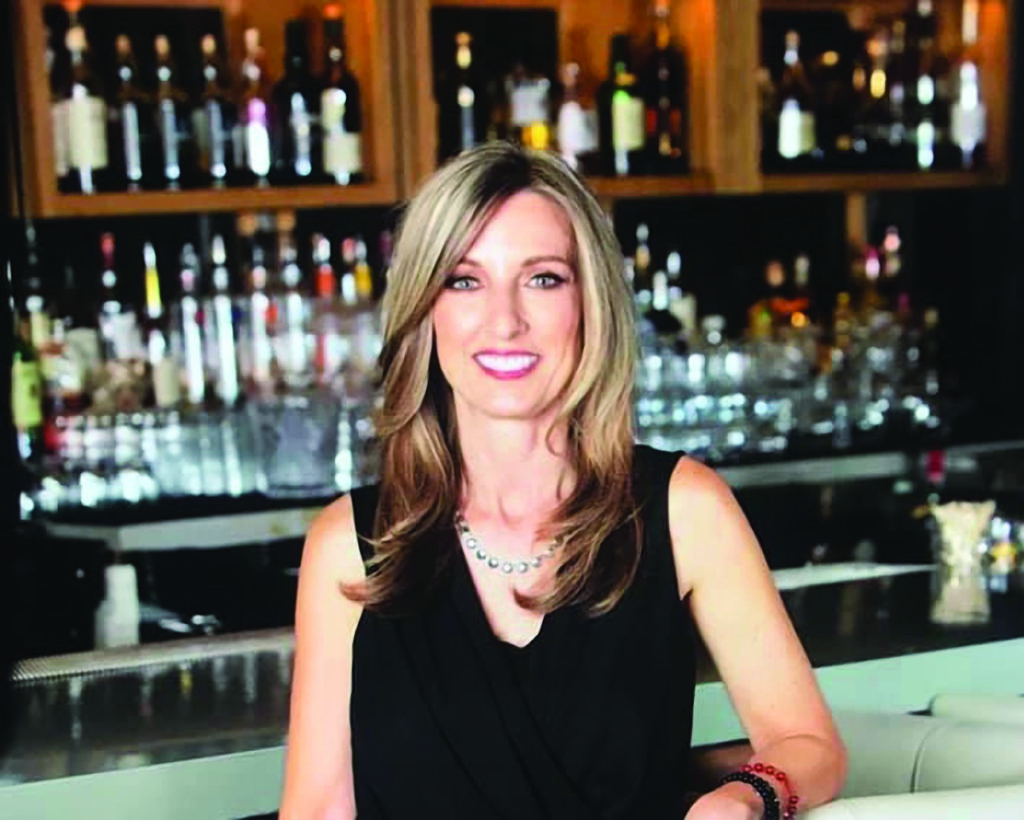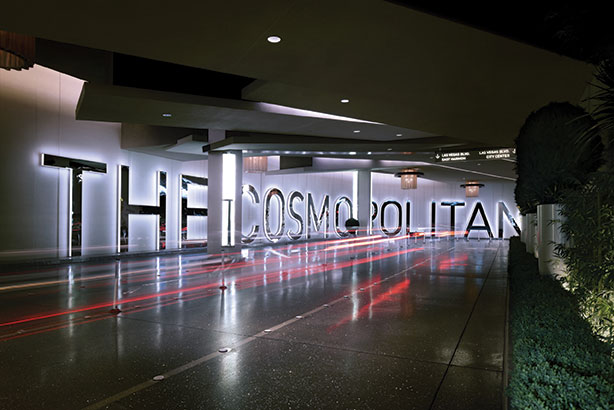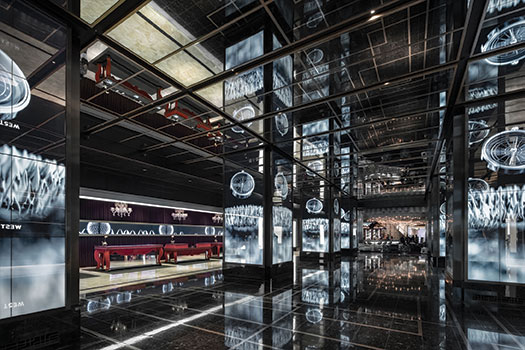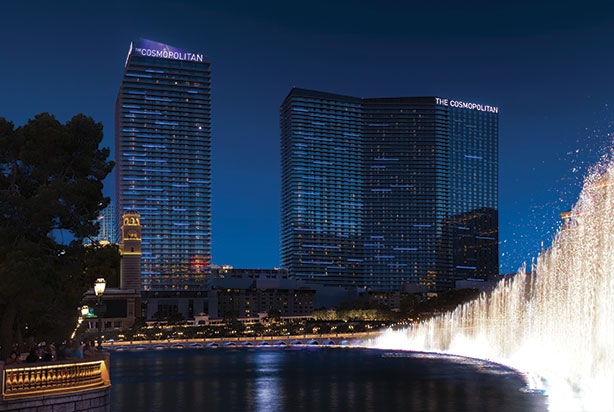A Focus on Wellness: Michelle O’Hala of the Cosmopolitan Las Vegas on Work-Life Balance and the Hospitality Industry

Michelle O’Hala is a true hospitality rockstar and one of my favorite Tripleseat customers. She’s always so energetic and positive when we talk, and you can tell that she genuinely cares about her work and co-workers and loves what she does. O’Hala will tell you that she is living with intention. Joy, to her, is bringing people together, creating memories, and having a passion for connection.

At The Cosmopolitan of Las Vegas, O’Hala oversees sales for all restaurants, lounges, resort pools, and other entertainment events. Before joining The Cosmpolitan in 2015, she worked for nightlife powerhouse Tao Groupand Morton’s Steakhouse. With more than 30 years of event sales experience, she leads with grace, integrity, hospitality, and heart.
In addition to her many years of experience working in hospitality, O’Hala is a 20-year yoga practitioner with more than 10 years of experience as a certified yoga instructor. This combination certainly gives her the knowledge and capacity to speak on behalf of maintaining a fulfilling career, home life, and self-care routine.
O’Hala spoke at our 2022 EventCamp conference in September about how she manages a healthy worklife balance in the hospitality industry. I was intrigued by her talk and wanted to pick her brain even more on the topic. We sat down to talk about our shared love for the hospitality industry and our struggles and triumphs when trying to find and maintain a work-life balance. Here’s a look at our conversation.
Kennedy: Having been employed in restaurants for many years, I understand first-hand the issue of maintaining a work-life balance while working at a restaurant. Work-life balance is the entire reason why I left restaurants. When I got married and had children, I was worried I wouldn’t be able to juggle it all at the level I wanted to. But, like you, many people have done it all and done it well. What advice would you give to a restaurant employee who feels the same way I did?
O’Hala: I feel that our industry needs to change. I think we’d agree that over our careers, we’ve seen that some of the hospitality companies we’ve worked for were not providing a good enough work-life balance for their employees, and that’s the first thing that needs to change.
Since the pandemic, there’s been more focus on it, and we know now that all employees deserve a good quality of life. I’ve been really fortunate, I was at Morton’s Steakhouse for 19 and a half years, and they provided excellent work-life balance. I could work and raise my children. I would not make the change to working at a hotel until my kids were older because I was afraid of disrupting that work-life balance and having it sway to more of the work side.
I turned down jobs for years and stayed in my little bubble at Morton’s doing what I loved because I was determined to raise my kids a certain way. I think some hospitality companies are already providing that balance, but there’s much more to come. I think it’s a highlight for hotels and restaurants to do better and staff accordingly. I realize we’re still in a staffing shortage, so this will take some time. But, I believe this is an important issue that needs to be addressed and changed within the culture of our industry.
We know that some of the best people that work for us are mothers. Mothers are great at time management, completing all the tasks they need every day and making it all work. So I think hospitality companies will evolve to include a better work-life balance knowing that our workforce is diverse and we need to take care of our workforce.
Until that happens, if you’re in a situation where there isn’t a great work-life balance, placing boundaries between yourself and the restaurant or hotel you work for is essential. I realize this is hard because it’s challenging for hospitality workers to say no if they offer overtime or extra hours. But it’s crucial to maintain those boundaries for yourself, and your family and employers need to respect that.
Kennedy: I agree with you and, at the same time, realize how difficult it is to say no to extra shifts, primarily when you work for tips. I remember always saying yes to extra shifts because saying yes was a guaranteed additional $200-$300 cash in my pocket.

O’Hala: Don’t you think we all learned that we could do a little better with a little less during the pandemic? Chasing the dollar is not what we need to do because burnout is not OK. The pace we were all working at before the pandemic is not OK. Nobody at the end of their life will say, “Oh, I wish I worked more hours.”
I grew up in the ’80s and ’90s, and corporate America worked hard and logged as many hours as possible. I can remember working 36 days in a row and feeling proud. I worked two jobs at two different restaurants, which was the culture I grew up in. There is something to be said about having a good work ethic and working hard, but not to the point of burnout. That isn’t going to do anyone any good.
Kennedy: Recently, people have begun to romanticize that burnout and brag about it any chance they can — which is crazy. Because, as you said, what did you gain from that?
Moving back to the issue of restaurants offering their employees work-life balance benefits — it’s clear that you’ve worked for some large hospitality groups like Morton’s and now with The Cosmopolitan. These groups have the means to offer more benefits to their employees. But what advice can you lend to smaller hospitality businesses that may not have the funds and resources of larger groups
O’Hala: Yes, absolutely. As I mentioned during my EventCamp talk, it doesn’t cost anything to meditate or to provide meditation exercises during a pre-shift. I have been doing breathing and yoga pre shifts at Momofuku for a while because the chef is really into yoga and breathing. Every few weeks, I change out of my suit, put on my yoga gear and mala beads, and run down and do a 15-minute yoga session before the shift.
Even if you can hire a yoga or meditation instructor to come once a month or consult with one to build a pre-shift program, that would be great. Or provide resources from your city. Search for free local mental health programs, and provide that information to your employees. There are local organizations in every town; you just have to find them. There are also many online resources and free videos that restaurant operators could learn from themselves and take to their employees during pre-shift.
Kennedy: That’s excellent advice, and it would also benefit the restaurant operators themselves, not just their employees.
At EventCamp, you spoke about eight things you do every day to promote wellness in yourself. Can you talk about those eight things and where that list originated from?
O’Hala: So that list came from a dear friend and mentor, Tim Schneider. He founded Aegis Learning and wrote “A Heart for Leadership,” “Lead Well,” and “Beyond Engagement.” You can find more information on Tim and his teachings at discoveraegis.com.
Kennedy: How did your journey with Tim begin?
O’Hala: Tim came in to do some leadership training for my team and brought information regarding the emotional guidance scale. There have been a ton of books written about emotional guidance. It’s not something I made up or Tim made up. Abraham Hicks invented it, and you can find more information regarding its use online.
But Tim’s leadership training was very impactful. When he came in to speak to my team, I was blown away because my yoga world and professional world collided. Many things I live by within the yoga lifestyle correlate to Tim’s leadership training. Quite honestly, I also brought this guidance to my yoga classes. Every week during class, I’d talk about one of the items on the list and how it can be beneficial and talk through it with my class.
Kennedy: Clearly, you were already practicing some of the items on the list because you’re a yoga instructor. How did you incorporate all of the items into your daily routine?
O’Hala: When I was first introduced to this specific training, a few things stuck out to me, and I added those things to my daily routine. If you tweak your daily routine by one or two of these things, I think it can make a difference. For example, the first item on the list is to practice gratitude. I’ve added an alarm to my phone for 7:45 am every day that tells me to practice gratitude and list what I’m grateful for. What’s interesting about writing it down and practicing it for 30 days or more is that the answers change. At first, you write down that you’re grateful for your family, your job, etc., but as the days go on, you realize how much you enjoy the little things. Like, wow, I’m grateful for the sun today. I’m grateful for the fresh air I’m breathing. It changes your outlook and how you start appreciating all the small things in your daily life.

The second item on the list is to play and have fun; yes, I do this daily. I love stand-up comedy. So, on my way home from work every day, I listen to the comedy channel on Sirius radio. I purposely make time in my schedule to laugh every day, and I feel the benefits from that.
The third item is providing forgiveness. This is one that I continue to do, and it gets intense. I suggest doing this for at least a year. There are things that I added to this list months ago and still haven’t removed. So it’s essential to practice this one for a more extended period to feel the benefits. It gets intense, and there are a few things on my list that I have yet to forgive myself for.
Next is yoga and meditation. Yoga is actually moving meditation, and because I practice yoga frequently, I definitely do this every day. Some nights I go into my yoga space and just throw on meditation to listen to; even five or 10 minutes is impactful. They say in our yoga practice that we do this active practice because the yogis sit and meditate for eight hours. I’m not there yet, but even a few minutes is a great place to start. The thing about meditation is that you have to keep going back to it. Somedays, your mind isn’t in a great place to meditate; it keeps wandering and wandering. But, there are other days that it feels more manageable. You just have to keep doing it.
Kennedy: To be honest, I’ve tried to mediate repeatedly and have never been able to concentrate and focus. I’m constantly giving up and then going back to try it again. Any advice to mediation newbies like me?
O’Hala: Right when you wake up, without distractions, if you can turn on a quick meditation from your phone before you do anything else, it’s a great place to start. Your mind hasn’t fully woken up yet, and it can be easier to focus on the meditation rather than everything else.
Kennedy: I am going to try that and report back. Let’s move on to the next item on the list, removing blame and judgment.
O’Hala: I practice removing blame and judgment by using the “see good, say good” method. Even with clients or guests, we sometimes get overwhelmed, and you have to try not to judge them. The person who calls me today that needs to book a party of a hundred; instead of wondering why they are calling so last minute and getting bothered by it, focus on the good, the fact that yes, I can accommodate your group, and thank you for the business. See the good and say the good instead of focusing on the negative.
Volunteering is another item on the list. This is something I wish I had the time to do more outside of work, but I do try to mentor people at work as frequently as possible. The next item is to connect deeply, and this is something that I find to be very relevant working in hospitality. I think that being at EventCamp was healing for me. Being with our peers in the hospitality industry was so good and felt so good; it was a big part of healing for me.
And finally, the last item is finding your purpose every day. This is an easy yes for me. Every day I know my purpose with my work, which is fantastic to connect those two things because some people can’t connect them at all, which is sad to me. I enjoy going to work every day. When I was a server, a food and beverage controller, or in the position I’m in today, I loved coming to work because I love what I do, and it doesn’t feel like work.
Kennedy: This is all excellent advice and items that anyone working in hospitality can practice every day in order to achieve a more balanced work-life feeling. On the topic of work-life balance, I feel as though in the world we live in today, it’s difficult to unplug when you get home from work. Even working in hospitality, it’s so easy to receive texts from co-workers or reply to emails while sitting on the couch when you get home. What advice can you give to people who are never unplugging from their job — no matter what time it is or where they are — because of technology?

O’Hala: It’s hard; I get it. Something that I do that I think is helpful is moving my email app to another screen on my phone so it’s not visible every time I look down. I’ll text with friends, but then an email pops up on the same screen, and it’s hard not to look at it. So moving my email to the second or third screen has worked well for me.
I’ll also put my out-of-office on to create those boundaries. In the message, I’ll write that they can call my work cell phone if it’s an emergency. But most of these situations are not emergencies, and if they know I’m out of the office, most times, they won’t reach out to me. I do think people today, even though they want things faster, do realize that we all need our alone time and time to recharge. I frequently check my texts because I usually work with someone who actually needs something from me right away, but clients use email, and that’s why I add my out-of-office message and move my email app to another screen.
I’m just trying to protect my self-care time. That’s what this is all about, really taking care of yourself. I need to recharge on my weekends and my days off so that I can give 110% to my co-workers and clients when I am at work. That’s true work-life balance.